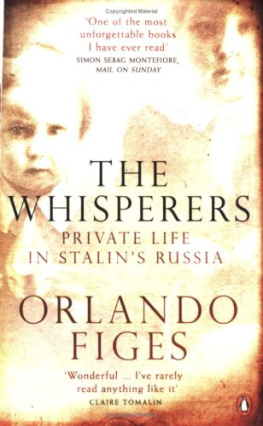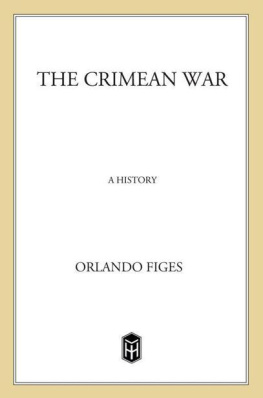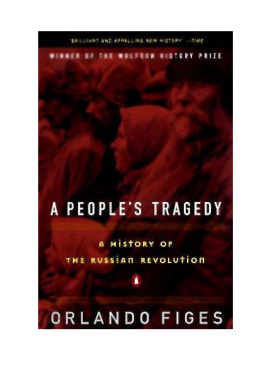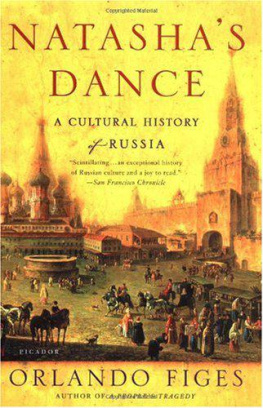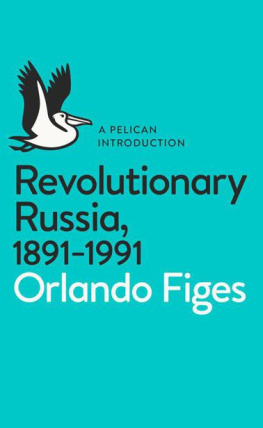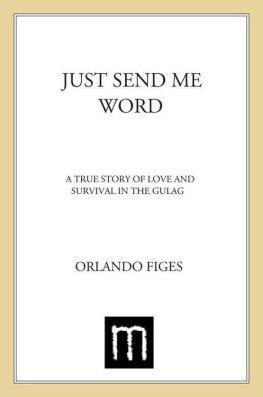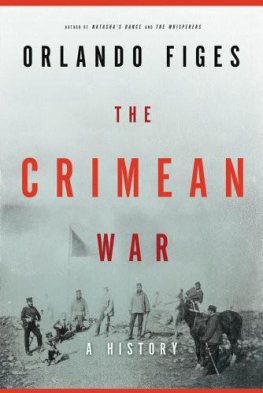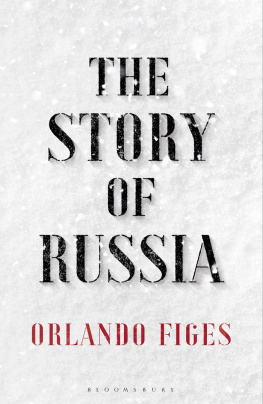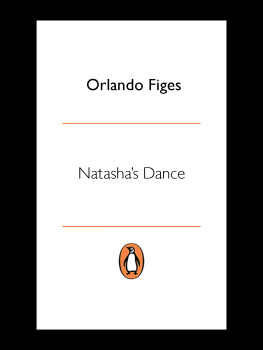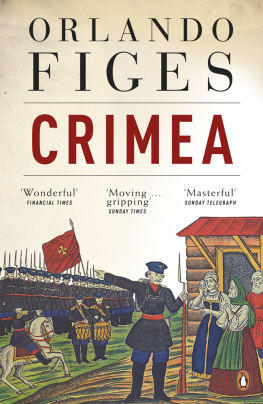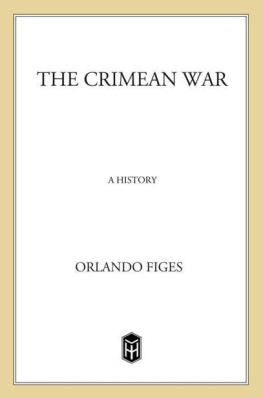Orlando Figes - The Whisperers
Here you can read online Orlando Figes - The Whisperers full text of the book (entire story) in english for free. Download pdf and epub, get meaning, cover and reviews about this ebook. year: 2007, publisher: Penguin Books, genre: Home and family. Description of the work, (preface) as well as reviews are available. Best literature library LitArk.com created for fans of good reading and offers a wide selection of genres:
Romance novel
Science fiction
Adventure
Detective
Science
History
Home and family
Prose
Art
Politics
Computer
Non-fiction
Religion
Business
Children
Humor
Choose a favorite category and find really read worthwhile books. Enjoy immersion in the world of imagination, feel the emotions of the characters or learn something new for yourself, make an fascinating discovery.
- Book:The Whisperers
- Author:
- Publisher:Penguin Books
- Genre:
- Year:2007
- Rating:3 / 5
- Favourites:Add to favourites
- Your mark:
- 60
- 1
- 2
- 3
- 4
- 5
The Whisperers: summary, description and annotation
We offer to read an annotation, description, summary or preface (depends on what the author of the book "The Whisperers" wrote himself). If you haven't found the necessary information about the book — write in the comments, we will try to find it.
The Whisperers — read online for free the complete book (whole text) full work
Below is the text of the book, divided by pages. System saving the place of the last page read, allows you to conveniently read the book "The Whisperers" online for free, without having to search again every time where you left off. Put a bookmark, and you can go to the page where you finished reading at any time.
Font size:
Interval:
Bookmark:
The Whisperers has a long history. The idea of the book goes back to middle of the 1980s, when I was a graduate researcher in Moscow. As a student of the Russian Revolution and the Civil War, I was eager to meet anyone who could still recall that period. I had become friends with Zhenia Golovnia, the granddaughter of the film-maker Anatoly Golovnia. Her mother, Oksana, told me many stories about the familys history in the 1920s and 1930s, and put me into contact with some friends, who had been born in the peaceful times, as she liked to call the years before the First World War. Over the next months, I visited the homes of about a dozen of Oksanas friends, mainly elderly ladies, who were too young to recall anything about the Civil War and, it seemed, too nervous to speak in depth about the history that had really shaped their lives: the years of Stalins rule.
That first attempt at an oral history taught me to appreciate the importance of family memory as a counterweight to the official narrative of Soviet history. After 1991, I thought again about the possibility of researching for a book on the subject of The Whisperers. The sudden outpouring of personal memoirs about the Stalinist repressions encouraged the idea. But my instinct was that older people, on the whole, would keep their thoughts and feelings to themselves until they were sure that the Communists would not return, and that might take many years. In some ways I was wrong: the early 1990s are now widely seen as the heyday of oral history in the former Soviet Union, certainly compared with the Putin years, when the restoration of authoritarian government encouraged many Russians to return to their reticent habits. But in other ways my instinct had been right: for what people wanted to record in that first rush of commemoration were the facts of their repression, the details of arrest, imprisonment and rehabilitation, rather than the damage to their inner lives, the painful memories of personal betrayal and lost relationships that had shaped their history.
By 2002, when I finished working on Natashas Dance, I felt at last the time had come to approach this uncharted territory. The last generation to reach adulthood before 1953 was disappearing fast, so there was a sense of urgency that this was our last real chance to understand the Stalin period through the internal life of ordinary families and individuals. The average age of the people giving interviews and archives to the research project for The Whisperers was eighty. To the best of my knowledge, at least twenty-seven of them died (about 6 per cent of the total sample) before the completion of the book.
My first inquiries were directed to the Russian state and public archives, where I hoped to locate private papers about family life and then conduct interviews with the people who donated them. This involved a very long and ultimately rather fruitless trawl through collections of letters, notebooks, diaries and memoirs, often written in a barely decipherable scrawl, yielding bits of information from which it was difficult to draw any conclusions (almost nothing from these archives went into The Whisperers). At this stage of my research I was helped by several employees: Katia Bunina and Julia Sharapova, who worked with me in the Moscow archives; Nikolai Mikhailov, who collected materials from the archives in St Petersburg; and Nikolai Kuzmin, who worked in the archives in Orel and elsewhere. I would also like to thank my two old teachers and comrades for their support in these early stages of research: Viktor Danilov (19252004), the historian of the Soviet peasantry, who took a keen interest in my research and helped to open doors in RGAE; and Teodor Shanin, who gave my project the backing of the Moscow School of Social and Economic Science.
Simultaneously with my searching through the archives, I would visit people in their homes, listening to their stories from the Stalin period and asking whether they had private papers they could give. The project spread by word of mouth still the most efficient means of working in Russia as contacts I developed told their friends about my work. I was overwhelmed by the interest from people asking to be interviewed, offering a family memoir, letters, notebooks or some other precious manuscript they wanted me to publish (or perhaps hoped to sell). It is impractical to thank everyone who helped me at this stage (they are named in the List of Interviews) but I owe a special debt to Sasha Kozyrev, who kindly agreed to interview a number of his friends and acquaintances in St Petersburg; Ida Slavina, who gave me several interviews, many documents and photographs from her archives and sent me articles and information about her family; Yevgeniia Vittenburg, Ada Levidova, Bella Levitina. Olga Ramenskaia and Galina Petrova, who all gave interviews and family archives to the project; Leonid Makhnach, who put his recollections into lucid prose and handed over precious documents; Vakhtang Mikheladze, who gave several interviews and put me into contact with his family in Tbilisi; and Zhenia Golovnia, who not only transcribed and scanned her family archives, but also made available the many interviews and documents she had collected from former prisoners and administrators of the ALZhIR labour camp for her film Izmennitsy (1990). Zhenia advised me on the complex history, the rumours, intrigues and personalities of the Soviet film world and introduced me to many families with interesting stories and archives from the Stalin period.
It was through Zhenia that I met Aleksei Simonov, to whom I owe the greatest debt of all. I had already known of Aleksei as a film director, journalist and activist for human rights and press freedom (in 1999 he became the President of the Foundation for the Defence of Glasnost in Moscow), but I did not know his familys extraordinary history, for the story of the Laskins, on his mothers side, had been almost totally excluded from the biographies of his famous father which I read in preparation for my first meeting with him in his Moscow flat, just around the corner from Konstantin Simonov Street. Aleksei had kept the Laskin family archive in a drawer following the death of his mother, Zhenia Laskina, in 1992. From these materials he had written his own touching memoir of his parents (Chastnaia kollektsiia) in 1999, but from the start he welcomed my interest and put his trust in me to become what he called the familys historian. Aleksei allowed me to copy the Laskin archive. He gave up many hours from his busy working schedule to brief me on the details of his familys history and correct my mistakes. Aleksei is a marvellous raconteur. In our many interviews and conversations around the kitchen table in his flat, often lasting late into the night, he conjured up so vividly the special atmosphere of the Laskin household a warmth and informality that Aleksei and his wife Galina have managed to preserve in their home that I began to feel that I was not just a historian but practically a member of the extended family. I had the same sensation whenever I visited Alekseis aunt, Fania Samuilovna, or Dusia, as she is called, the last surviving Laskin sister, who lives with her son on the eleventh floor of a modern tower block near Ilich Square. Fania was moved to the apartment in 1990, after she and her sister Sonia were evicted from their home in Sivtsev Vrazhek, where the family had lived for nearly sixty years. Sonia died in 1991. Fanias memory is faltering. She was ninety-seven when she gave me her final interview. But sometimes, when I asked her about something we had discussed many times before, she would suddenly recall a long-forgotten detail about the Laskin family which otherwise would never have been known. For this reason, but mainly for her charm, I learned to cherish every moment spent in Dusias company.
Font size:
Interval:
Bookmark:
Similar books «The Whisperers»
Look at similar books to The Whisperers. We have selected literature similar in name and meaning in the hope of providing readers with more options to find new, interesting, not yet read works.
Discussion, reviews of the book The Whisperers and just readers' own opinions. Leave your comments, write what you think about the work, its meaning or the main characters. Specify what exactly you liked and what you didn't like, and why you think so.

